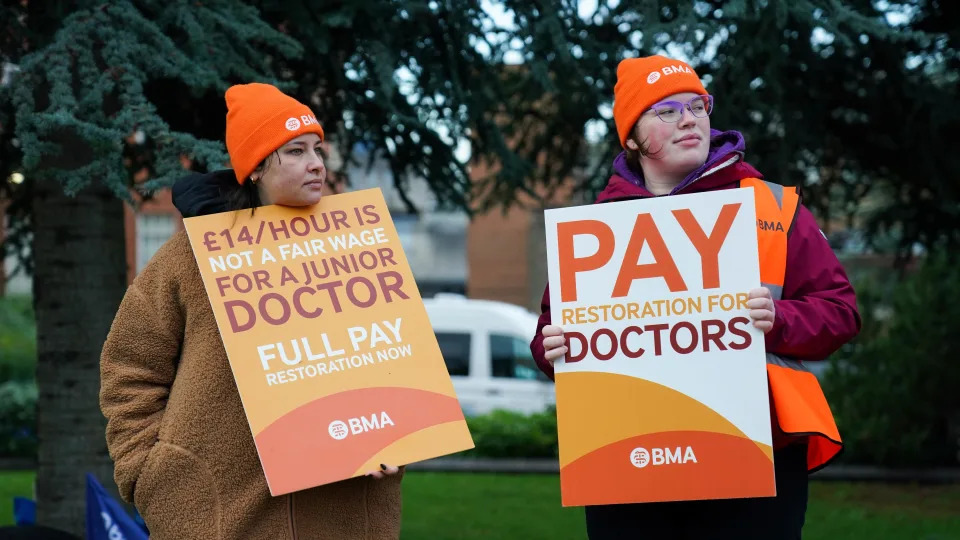Storm Newton, Health Reporter
23 December 2023

NHS junior doctors in England have returned to work after a 72-hour strike, but their next spell of industrial action is less than a fortnight away.
The effect on the NHS of the latest walkout is not yet known, but health leaders warned earlier this month that an impact on patient care would be “inevitable”.
They are preparing for the longest spell of industrial action in the history of the NHS, which will take place in the new year.
Over the last three days, the British Medical Association (BMA) has urged the Government to get back around the table with junior doctors with a “credible” offer, and called on Health Secretary Victoria Atkins to “stop trying to divide the profession”.
But Prime Minister Rishi Sunak branded the action “disappointing” and urged junior doctors to call off strikes.
“The only workforce that is refusing to settle are the junior doctors which is really disappointing, particularly at this time of year when everyone relies so heavily on the NHS, and we’ve been consistently constructive and open to talks,” he told broadcasters on Friday.
“I would urge junior doctors to re-engage in those talks and call off strike action. And I think everyone can see that the Government has acted constructively here because we’ve managed to reach agreement, as I said, with every other workforce in the NHS.”
Industrial action was announced earlier this month after weeks of talks between unions and ministers.
Junior doctors were offered a 3% rise on top of the average 8.8% increase they were given in the summer.
But the BMA said the money would have been split unevenly across different grades and would “still amount to pay cuts for many doctors”.
On Thursday Ms Atkins suggested “many, many doctors” would be feeling “deeply uncomfortable” about the timing of strikes.
The health service is facing mounting seasonal pressure, with officials expecting it to be the most challenging winter yet.
Dr Robert Laurenson and Dr Vivek Trivedi, the co-chairmen of the BMA’s junior doctors’ committee, said the comments were “disappointing” after what they had thought was “an improved tone and approach from Ms Atkins”.
Their statement added: “We did not walk away from negotiations and we are happy to talk to Ms Atkins at any time.
“It is the Government’s insistence that they will not talk while strikes are scheduled that is blocking progress and wasting unnecessary time.
“We appeal directly to Ms Atkins and the Government to drop this precondition and get back around the table.”
The next junior doctors’ strike will begin at 7am on January 3 and end at 7am on January 9.
It will be the longest strike in the 75-year history of the NHS.
Earlier this week, NHS Employers chief executive Danny Mortimer wrote to Professor Philip Banfield, BMA chairman of council, saying hospital staffing levels during this week’s strike “will not be tenable”.
He wrote: “In the previous periods of industrial action taken solely by your junior doctor members, the core duties typically carried out by striking junior doctors have been covered by other medical colleagues and members of the wider team.
“This position will not be tenable in January.”
Junior doctors in Wales are planning a 72-hour walkout from January 15, while doctors in training in Northern Ireland are being balloted for strike action.
Those in Scotland have already come to an agreement with the Holyrood Government.
First Minister Humza Yousaf reiterated his Government’s offer to mediate talks between UK ministers and unions.
In a post on X, formerly Twitter, Mr Yousaf said: “In Scotland, we have avoided NHS strikes by agreeing a fair pay deal with junior doctors.
“I reiterate our offer to the UK Government that we’re willing to mediate in their dispute, so no more days of NHS activity are lost to strike.”
It will be the longest strike in the 75-year history of the NHS.
Earlier this week, NHS Employers chief executive Danny Mortimer wrote to Professor Philip Banfield, BMA chairman of council, saying hospital staffing levels during this week’s strike “will not be tenable”.
He wrote: “In the previous periods of industrial action taken solely by your junior doctor members, the core duties typically carried out by striking junior doctors have been covered by other medical colleagues and members of the wider team.
“This position will not be tenable in January.”
Junior doctors in Wales are planning a 72-hour walkout from January 15, while doctors in training in Northern Ireland are being balloted for strike action.
Those in Scotland have already come to an agreement with the Holyrood Government.
First Minister Humza Yousaf reiterated his Government’s offer to mediate talks between UK ministers and unions.
In a post on X, formerly Twitter, Mr Yousaf said: “In Scotland, we have avoided NHS strikes by agreeing a fair pay deal with junior doctors.
“I reiterate our offer to the UK Government that we’re willing to mediate in their dispute, so no more days of NHS activity are lost to strike.”
No comments:
Post a Comment